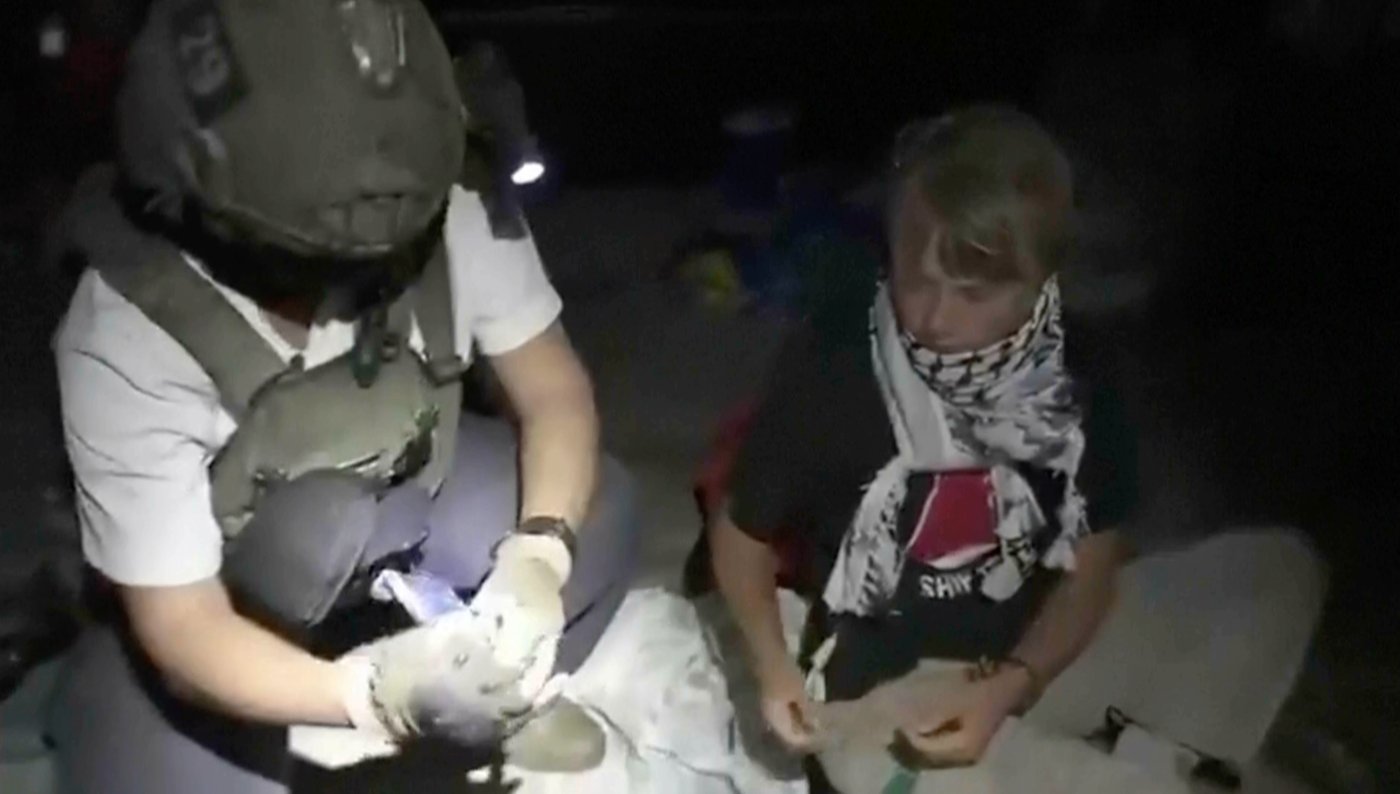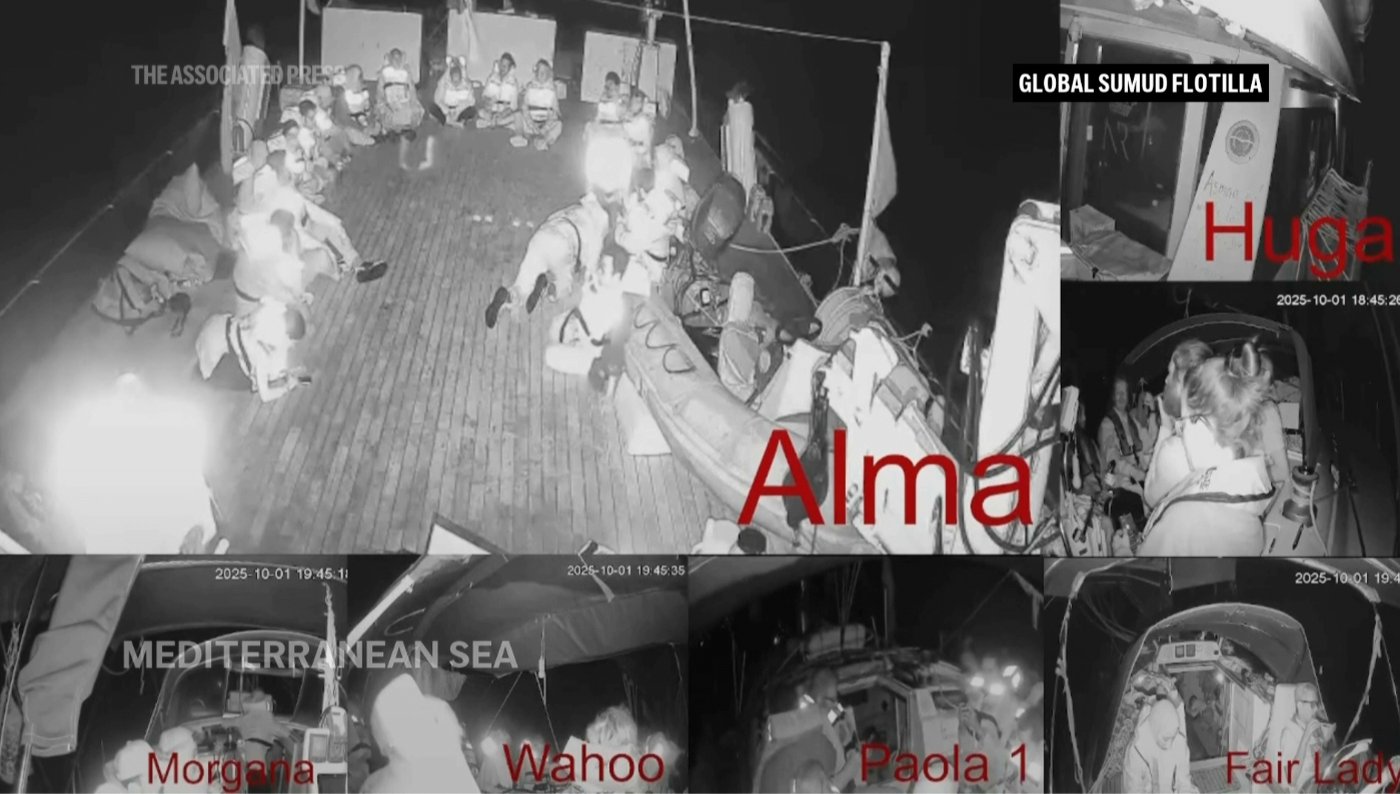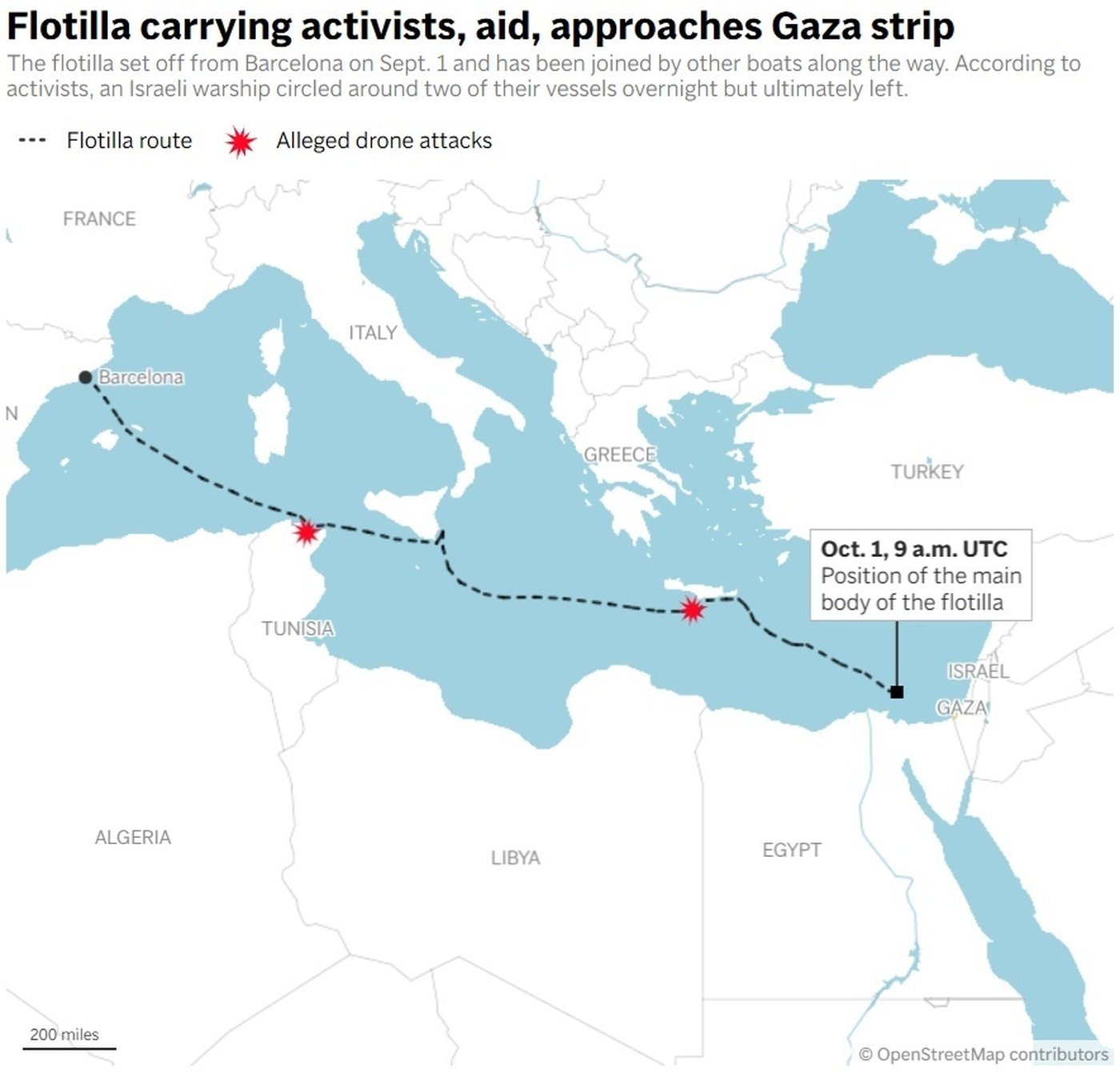Elevate your local knowledge
Sign up for the iNFOnews newsletter today!
Sign up for the iNFOnews newsletter today!
Selecting your primary region ensures you get the stories that matter to you first.

JERUSALEM (AP) — Activists on board a flotilla of vessels sailing toward Gaza said late Wednesday that the Israeli navy had intercepted at least 19 of its boats as they approached the besieged Palestinian territory. Israeli authorities said the activists on board, including Greta Thunberg, were safe and being transferred to Israel.
The Global Sumud Flotilla, composed of nearly 50 boats and 500 activists, is carrying a symbolic amount of humanitarian aid to Gaza. The Sirius, Alma and Adara boats were intercepted some 70 nautical miles (80 miles) from the coast of Gaza, according to organizers who shared live positions of the flotilla. The group, which includes Nelson Mandela’s grandson, Mandla Mandela, former Barcelona Mayor Ada Colau and several European lawmakers, said it remained undeterred in its mission to break the Israeli blockade and bring aid to Palestinians.
Just before dawn, organizers said on their official Telegram channel that 19 of 43 boats had been intercepted and said the remaining vessels would keep sailing toward Gaza.
Greg Stoker, an American veteran aboard the Ohwayla, one of the boats in the flotilla, said that around a dozen naval vessels with their transponders off had approached it. “They are currently hailing our vessels, telling us to turn off our engines and await further instructions or our boats will be seized and we will face the consequences,” he said in a shaky video posted on Instagram. Israeli authorities used water cannons against some of the boats, Stoker and other activists reported on social media.
The Israeli Foreign Ministry posted a video on X showing Thunberg sitting on a ship’s deck being handed a water bottle and raincoat.
It said that several boats “have been safely stopped and their passengers are being transferred to an Israeli port. Greta and her friends are safe and healthy.”
Italy’s Foreign Minister Antonio Tajani said the Israeli operation was expected to take 2-3 hours. He told state TV Rai that the boats would be towed to Israel’s port of Ashdod and the activists would be deported in the coming days. He also said Israeli forces have been told “not to use violence.”
Turkey’s Foreign Ministry condemned Israel’s interception of the boats denouncing it as an “act of terrorism” and severe breach of international law. In a statement, the ministry said it was taking initiatives to ensure the immediate release of Turkish citizens and other passengers detained by the Israeli forces.
Colombia President Gustavo Petro said late Wednesday he would expel Israel’s diplomatic delegation in the South American country if the Israeli military intercepted the flotilla. He said he will also terminate his country’s free trade agreement with Israel.
Petro has repeatedly described Israel’s siege of Gaza as genocide. He broke diplomatic ties with Israel in May 2024 over the Israel-Hamas war, prompting the departure of Ambassador Gali Dagan, but an unspecified number of consular services staff remain in Colombia.
The flotilla enters a ‘danger zone’
The vessels were sailing in international waters north of Egypt and had entered what activists and others called a “danger zone.” While still in international waters, it is an area where the Israeli navy has stopped other boats attempting to break its blockade in the past and which the flotilla has been warned not to cross.
After a tense encounter with two Israeli military vessels in the early hours of Wednesday, activists had resumed their journey and were broadcasting their voyage on livestreams from several of the boats. Some activists held up messages of solidarity with people in Gaza and chanted “Free Palestine!” on camera. Music could be heard playing in the background.
As night fell, they detected via radar several unidentified vessels approaching them and put their life vests on ahead of the Israeli military’s imminent arrival. Some activists were able to broadcast the moment Israeli forces approached them live from their smartphones before tossing their devices into the water.
The flotilla, which began its journey from the Spanish port of Barcelona a month ago, was to reach the shores of Gaza by Thursday morning, organizers had said earlier.
Activists had acknowledged that scenario was unlikely and were expecting Israeli authorities to try to stop them at any moment, as they have done in past attempts.
But this flotilla, with dozens of boats, was the largest attempt yet to break the Israeli maritime blockade of the Gaza strip that has been ongoing for 18 years.
Israel and other governments had warned them to turn back
The Israeli navy had reached out to the flotilla earlier Wednesday warning them that they were approaching an “active combat zone” and asking them to change course, the Israeli foreign ministry said, reiterating its offer to transfer the aid to Gaza through other channels. Israel’s Foreign Minister Gideon Saar called the flotilla a provocation.
Israel’s government has accused some of the flotilla members of being linked to Hamas, while providing little evidence to support the claim. Activists have strongly rejected the accusations and said Israel was trying to justify potential attacks on them.
European governments, including Spain and Italy, which had sent their navy ships to escort the flotilla during part of its journey, urged the activists to turn back and avoid confrontation. But while Italy’s Premier Giorgia Meloni said late Tuesday the flotilla’s actions risked undermining U.S. President Donald Trump’s recent proposal for resolving the war in Gaza, Spain’s prime minister defended them.
“We must remember it is a humanitarian mission that wouldn’t be taking place if the Israeli government had allowed for the entry of aid,” Pedro Sánchez told reporters on Wednesday. Spaniards taking part would benefit from full diplomatic protection, he added.
“They present no threat nor danger to Israel,” he said.
What international maritime law says
The U.N. Convention on the Law of the Sea stipulates that a state only has jurisdiction up to 12 nautical miles (19 kilometers) from its shores. In general, states don’t have the right to seize ships in international waters, though armed conflict is an exception to this.
Yuval Shany, an expert on international law at Hebrew University in Jerusalem, said that as long as Israel’s blockade of Gaza is “militarily justified” — meant to keep out weapons — and the ship intended to break the siege, Israel can intercept the vessel after prior warning. Whether the blockade is militarily justified and the legality of the blockade is a point of contention.
But the flotilla argues they are a civilian, unarmed group and that the passage of humanitarian aid is guaranteed in international law.
Omer Shatz, an Israeli international law expert who teaches at Sciences Po University in Paris and co-litigated a previous flotilla case before the Israeli supreme court, told The Associated Press that even if the disputed siege of Gaza was considered lawful, “international law paves a humanitarian road from the high seas to Gaza — both in international and national waters off Gaza,” he said.
“If the basic needs of the population are not provided by the occupying power, there is a right to provide humanitarian aid, albeit under certain conditions,” Shatz said. Israel, for example, would have a right to board and search the vessels carrying aid to verify its cargo, similarly to what it does with aid trucks crossing into Gaza by land.
____
Brito reported from Barcelona, Spain.





This site is protected by reCAPTCHA and the Google Privacy Policy and Terms of Service apply.
Want to share your thoughts, add context, or connect with others in your community?
You must be logged in to post a comment.